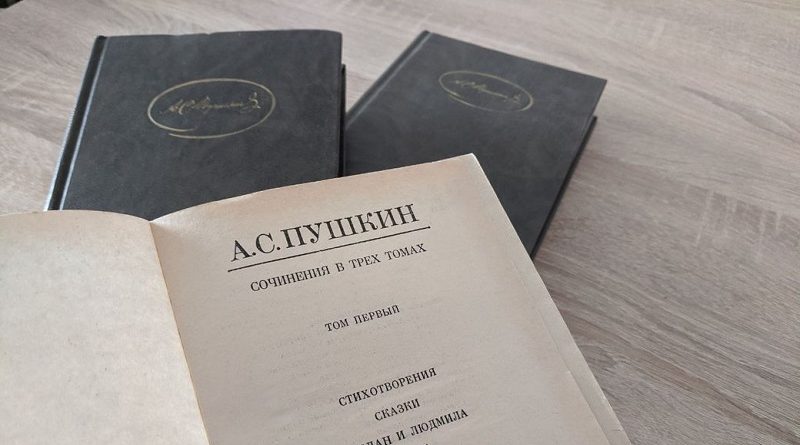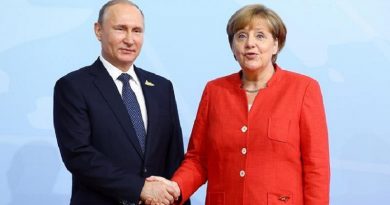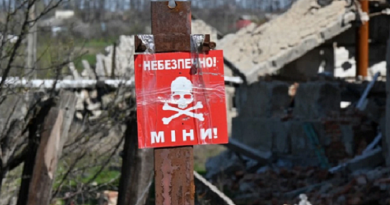Flirting with the Abyss: Russia’s Barbaric War and Crimes Against Humanity
After months of ceaseless attacks, Russia occupied Mariupol, Donetsk oblast, Ukraine, cutting the city from the Ukraine-controlled territories. The destruction of the city that once was a center of vibrant developments has been razed. The number of killed and injured is unknown today, but the figures announced by various sources are appalling.
Mariupol became known to the world after Russia bombed the civilians seeking shelter in the local theatre. Reportedly, the number of victims of this attack can exceed 600 people. International channels broadcast an image of the building that the Russians bombed although a clear sign “Children” was written nearby on the ground revealing not only the vile nature of the Russian war against Ukraine but also the barbarity of Russian troops.
Cynically, Russian proxy officials posted videos and released statements about the need to reconstruct the theatre building that was, in fact, destroyed as a result of Russia’s shelling. The building today is covered with a screen that has portraits of people whom Russia regards as “great Russian artists”: Pushkin, Tolstoy, Gogol/Hohol. Surprisingly, this screen also includes a portrait of Taras Shevchenko, one of the poets and prophets of Ukrainian identity and a staunch fighter against Russian imperialism. As is widely known, Shevchenko wrote not only in Ukrainian but in Russian as well. Russia today uses this fact to present Shevchenko as a Russian poet. Recently, one of the monuments to Shevchenko in Russia-occupied Luhansk was updated with a plaque that identifies Shevchenko as such.
Resorting to culture, the Kremlin propagandizes its aggressive actions encouraging the destruction of Ukraine as an independent country and the eradication of Ukrainians as a nation distinctive from the Russians.
The screen that veils the crimes is quite eloquent: not only does it serve to cover Russia’s war crimes in Ukraine but it also deflects attention from the atrocities, from the killing, destruction, and ultimately genocide perpetrated against the Ukrainians, and instead emphasizes culture—which Russia learned how to exploit masterfully.
This image of destruction veiled by artists easily recognized even by those who never studied Russia and its history is sent initially not to Russians but to the international community. Indeed, many are captivated by Russian culture, but this captivation is safeguarded by Russia. A perennial image of Russia as a land of “mysterious soul” is a brand in itself that promotes an enigmatic perception of Russia claiming that it cannot be fully grasped and understood if one is not Russian. The conclusion is rather straightforward: one has to be or become Russian to understand Russia; otherwise, only a glimpse of what the “Russian world” is can be available—one can never be part of it.
To become Russian, one has to embrace Russia with all its quirks which are part of the Russian “mysterious soul.” But even then, the converted to Russian identity will be reminded of their non-Russianness and exclusion from messianic “Russian superiority and exceptionalism.” Mykola Hohol knew this better than anyone else in the nineteenth century. In an 1849 letter to Anna Vielgorskaia, who wanted “to become a Russian” not only in her soul but also in her language and in her knowledge of Russia, Hohol was rather reserved about her ambition. As he explained, it was accessible to learn the Russian language, but it would never lead to becoming a Russian in one’s soul: “[R]emember that if God does not wish this you will never become a Russian: back to the origin of everything Russian, to Him, you should follow this. God help you!”
Mykola Hohol tried to become Russian, but his Russian friends and counterparts would not miss an opportunity to remind him that he was not one, and would never be one. According to Fyodor Iordan, a Russian engraver and art professor (1800-1883), Hohol, when in Rome at the end of 1830s, decided to organize a charity evening to help his Ukrainian countryman (zemliak), Shapovalenko, a painter: Hohol read his Inspector General in front of a Russian-speaking audience at the residence of Princess Volkonskaia. However, Iordan notes, the audience was not quite enthusiastic, and after the first part, many guests were leaving, making negative comments: “He was feeding us this vulgarity in St. Petersburg, and now he brought it to Rome.” Ivan Turgenev who happened to meet Hohol in person writes: “Hohol spoke a lot, with liveliness, slowly striking and minting every word—not only did it not look unnatural, but, on the contrary, it gave his speech some pleasant weightiness and expressiveness. When speaking, he emphasized “o,” I did not notice other peculiarities of the malorossiiskii dialect less pleasant to a Russian ear.”
Mikhail Bulgakov, who unambiguously considered himself Russian and whose works are often mentioned as such that include chauvinistic comments on Ukrainians, was called in Moscow “a writer from Kyiv.” This does not mean that he was not accepted as a Russian writer, but this comment certainly includes some otherness that creates a gap between Russianness and non-Russianness for Russians.
The works of those whose screen portraits are used to cover the crimes in Mariupol are studied time and again in Russian departments across the world. It should be mentioned, Hohol’s Ukrainian background is often dismissed by many scholars of Russian literature outside Ukraine. Literary scholars in Russia scoff at remarks that position Hohol as part of Ukrainian literature.
This revered attitude toward Russian literature is part of Russia’s cultural expansionism that is veiled as a campaign that promulgates the values of ‘universal love, kindness, and forgiveness.’ Conveniently, aggressive policies that Russia has been espousing for decades are camouflaged by these virtues that the Kremlin puts under the banner of Russian civilization. Recently, Russian President Vladimir Putin during his address to the Russian youth mentioned that today Russia “can make the world more just.” One must wonder though, is Putin’s genocidal act toward Ukrainians a mission to “better the world”?
Russia’s derogatory attitude toward Ukraine and its people has long been known. Vissarion Belinsky, an alleged opponent of the oppressive policies of the Russian Empire, in his 1847 letter to Pavel Annenkov comments on the Ukrainians with vitriol: “Oh, these khokhols! They are stupid like rams and they fight for their liberal ideas in the name of halushky and varenyky with fat back!” Such repulsive statements continue to echo in the twenty-first century: in 2008, in his conversation with President George W. Bush, Putin mentioned that Ukraine “is not a country.”
The evidence that explains Russia’s continuing rejection of Ukraine as an independent political entity is abundant, but it falters to explain the barbarity with which the Russian militaries execute their orders today. When retreating in April from Bucha, Kyiv oblast, the Russian military signature shocked the world: mass graves, executions of civilians, rapes, tortures, destruction of culture and infrastructure—atrocities that violate and dismiss human lives and dignity—continue to take place in Ukrainian towns under Russian occupation.
Political dimension can be parsed through, but the hermeneutics of human dignity that the Russian military dishonor evades closures. When Russia launched the full-scale invasion, many observers outside Russia became numb: how could the country that gave the world Pushkin and Dostoyevsky venture for another war?
Russian President Putin has a soft spot for the nineteenth century of the Russian Empire, although in his November speech in which he describes Mariupol as a “Russian city,” he evokes the memory of Peter I, attempting to put himself on a par with the maker of the Empire. When asked to what czar would he compare Putin, a Russian historian named Nicholas I—a tyrant known not only for his sense of Russian superiority but also for his brutality and cruelty. In the history of Russian culture, the nineteenth century is presented as “the golden era,” and the international community resisted “canceling” Russian culture as one of the ways to show solidarity with the Ukrainians.
The crux of the matter is not canceling, though. The works that have been studied for centuries are part of global cultural memory: their presence and visibility can be reduced, but hardly can they can be erased or canceled. What seems to obfuscate this conversation is “blind spots” that have been created over the past centuries when approaching Russian literature. A reader embraces Russian writers of the nineteenth century as apostles of sacrifice, charity, pacifism, and a soul that seeks redemption, forgiveness, and universal love, and yes, seeks to better the world. But there is a darker side that is often minimized or presented as a screen/veil that should be lifted. It may appear, though, this is not the veil that should be removed to see the benevolent but the abyss that reveals its seductive charms.
Just a glimpse at Russian literature can be revealing about Russian barbarity today, but this gaze has to resist the revered enchantments with which readers approach “great” Russian culture. Readers are to dismiss the notion of “greatness” in order not to collapse into the abyss whose intriguing nature is omnipresent in Russian literature.
Russian literature of the nineteenth century is captivated by the seduction of the vile. The abyss Russian writers try to tame through narration fails to become a place of illumination: its seductive power prevails, and something essential and vital becomes eventually corrupt, questioned, and lost.
Feodor Dostoyevsky’s Crime and Punishment is known even to those who never took any Russian culture courses. But a priori one is already enchanted by the story of a young man who kills and then suffers: a synopsis that many will recount without reading the book.
The book encapsulates Dostoyevsky’s mastery of a highly nuanced depiction of how the human soul struggles with the temptations to descend into the darkness of murder. Rodion Raskolnikov’s step toward the point of no return fascinates its many readers; his long journey toward redemption inspires all-forgiveness and the rebirth of a soul and spirit. And what about the double murder that Raskolnikov commits? In the novel, the murder serves as a pretext for philosophizing, shifting the focus to how the human being can morally survive and recover from one of the deadliest sins.
Dostoyevsky also masterfully constructs the conditions for the murder: Raskolnikov, a law student, has to quit his studies due to financial hardships; moreover, his family is in plight, too. On the other hand, Alyona Ivanovna is an “ugly old woman” and her death, as Raskolnikov sees it, can appear beneficial. (A-la Raskolnikov Putin’s comment: bettering the world while eradicating Ukraine and its people!) Raskolnikov murders not only Alyona but her half-sister Lizaveta as well. His subsequent battle with his own self keeps going back to the murder of Alyona, while Lizaveta seems to become an unanticipated victim. Collateral damage? (In a notorious interview with the BBC, the Russian Ambassador to the UK when presented with visual evidence of the destruction of Ukrainian infrastructures, residential areas, and mass killings of civilians, cynically noted that any war entails “collateral damage.”)
Lizaveta as an accident victim is the crux of the abyss. But she, as well as Alyona, becomes a backdrop for Raskolnikov’s redemptive ramifications. Moreover, the reader is enticed to sympathize with his redemption while the two killed women are relegated to momentary sympathy. Eventually, Dostoyevsky presents Raskolnikov as a true victim: a victim of larger social factors, a victim of his own defiance, and a victim of self-punishment.
Of course, much more is at play when Raskolnikov goes through his inner conflicts before deciding if he can kill. After all, his name speaks for him—“raskol” in Russian can mean anything from a fissure and crack to conflict, split and nonconformity. A reading of Crime and Punishment can include all these facets—in a sense, Raskolnikov is a non-conformist; and in another sense, his soul is split, he is seduced by the vile, and he ventures to not only look into the abyss but delve into and indulge in it.
Raskolnikov’s words are cited time and again: “I wanted to find out then and quickly whether I was a louse like everybody else or a man. Whether I can step over barriers or not, whether I dare stoop to pick up or not, whether I am a trembling creature or whether I had the right. . .” Raskolnikov is tempted to test the limits of his inner being: he is obsessed with finding out if he is a man. Does a murder make one into a man? According to Raskolnikov, who is guided by hierarchical thinking, it can. The essence, however, centers on the very idea of entertaining the murder of another human being as a way to feel and establish oneself as a man. This justifiable murder is a murder of one’s self, nevertheless, Raskolnikov’s ensuing inner struggle entices the reader into the vortex of narration and philosophizing.
Stepping over barriers is delving into the abyss, and Raskolnikov accomplishes this final step.
While overwhelmed with these multiple threads of inner struggle that Dostoyevsky weaves in such a captivating way, the reader focuses on the murderer and his… victimization. Raskolnikov evokes sympathy and compassion which in some way make Alyona Ivanovna guilty for how he grew to see the world.
Russian literature of the nineteenth century produced a gallery of villains and seducers often presented in a compassionate vein. Alexander Pushkin’s Eugene Onegin seems to be alienated by the ennui of the aristocracy of the nineteenth century, but he also indulges in his unscrupulous flirtation with his dark side:
“My uncle’s goodness is extreme,
If seriously he hath disease;
He hath acquired the world’s esteem
And nothing more important sees;
A paragon of virtue he!
But what a nuisance it will be,
Chained to his bedside night and day
Without a chance to slip away.
Ye need dissimulation base
A dying man with art to soothe,
Beneath his head the pillow smooth,
And physic bring with mournful face,
To sigh and meditate alone:
When will the devil take his own!”
The last line can be an innocent joke, but at the beginning of the story, Pushkin lifts the veil of gallantry and invites the reader to see Onegin’s other side: callous and unapologetic. Tatyana eventually discovers that the man to whom she professed her unrequited feelings is a mirage, a collage of many characters. The theme of disguise and veil is often underestimated while a lot of attention is given to the artfulness in verse narration and to the themes of love and friendship, aristocratic society and country life, ennui and passion. One should not dismiss the fact that Onegin also kills his friend, Vladimir Lensky, although it may look like an accident ensued in the course of the duel. As if drawn by his remorse, Onegin departs, but returns, later on, to meet Tatyana again and his desire to possess her is reinvigorated. The reader is enticed into Onegin’s inner struggle, but the fact of the killing does not seem to occupy much space in the narration. Onegin is one of the characters in Russian literature who is masterfully presented as both a villain and a victim.
Another embodiment of ambiguity is created by Mikhail Lermontov in The Demon: “he was like evening in clear weather— // not day, nor night—not gloom, nor glow!”
Princess Tamara falls victim to the Demon’s charm, but, again, the reader is left with mixed feelings: the Demon was on the threshold between good and evil, and the angel’s protection of Tamara’s soul forces him to retreat into the abyss again:
“And, as he enters, love is winning,
his soul is opened to the good;
he thinks, for life a new beginning
has come, as he had prayed it would.
…
Then comes a grim prefiguration!
he enters—there in front of him
heaven’s envoy, the cherubim,
radiant, on his protective mission
keeps the fair sinner from all things
evil, defends her from perdition
inside the shadow of his wings;
and sudden light, from heaven down-beating,
blinded the Demon’s unclean sight;
instead of a sweet-spoken greeting,
heavy rebuke was prompt to smite.”
The Demon is depicted as a being that suffers and is lost; he is deprived of a chance to redeem himself and to complete his passage toward the other side of the abyss: external forces embodied by the cherubim pushed him back into the darkness. He seduces Tamara, who sees the Demon not as a vile being but as an exiled soul that is split and tormented. Tamara succumbs and dies. In The Demon, the brutal is narrated not only as potentially benevolent but as such that can invoke compassion.
Lermontov’s “The Hero of Our Time” should have long become a classic on the representation of Russian seducers, as well as Russian colonization tactics and narratives. Bela, a young Circassian, is objectified by the narrator, and she is turned into Pechorin’s trophy. She is dismissed as soon as she succumbs and the seducer is driven by his free and restless spirit. Pechorin also kills—his duel opponent Grushnitsky does not survive. Pechorin is tortured by a sense of struggle with his own self—again we sympathize with a victim, not a perpetrator.
Victimization of villains is a theme that is quite prominent in Russian literature. Interestingly, they become victims of external forces that are not under their control. This pattern is quite prominent in contemporary Russian politics vehemently endorsed by Putin: innocent Russia is attacked by the West, NATO, and alien ideologies, and, as a result, Russia believes it must defend itself. Russia, however, masterfully disguises its own aggression: the brutal invasion of Ukraine is presented as “liberation” of Ukrainians from the “Nazi regime”; the deportation of adults and children from Russia-occupied territories in Ukraine is touted as a gesture of care; the destruction of Ukrainian culture is explained as protection of Russia, Russian culture and language. And what is said about the massive killings of the Ukrainians? According to Putin, Russia is bettering the world: ideas that Dostoyevsky channels through Raskolnikov.
Russia collapsed into the abyss on February 24, 2022, and Putin and his collaborators misled their own people and the international community by propagating severe false accusations, striving to convince and manipulate the world that Russia is the victim—once again, the perpetrators disguise themselves as the innocent, the victims, the saviors.
When bolstered by the memory of the past, the military psyche of contemporary Russian troops is oblivious to the memory of crimes against humanity committed previously. The world that was supposed to learn lessons from the atrocious catastrophes of the twentieth century continues to be shocked by the Russian soldiers’ barbarity.
Russia has long-standing authoritarian tendencies and chauvinistic sentiments leading to both cultural and territorial expansionism. Russia’s sense of superiority, which covers its inferiority complex, keeps maintaining the desire to force its neighboring sovereign countries—Ukraine, Moldova, Georgia, Belarus—into the world of the past in which the legacy of the Russian Empire, as well as the Soviet Union, dominates and dictates the present. And to satisfy this voracious ambition, Russia has proven again and again that it will continue to commit inhumane crimes and monstrous violence at whatever costs to achieve its goals all in the nature of “veiled” victimhood.
Nataliya Shpylova-Saeed
(assistant professor in the Department of Russian and Eurasian Studies Program at Colgate University (Hamilton, NY), a Ph.D. in Slavic languages and literatures (Indiana University, 2022), a Ph.D. in American literature (Taras Shevchenko Institute of Literature, National Academy of Sciences of Ukraine, 2007))
Photo: Suspilne Rivne




